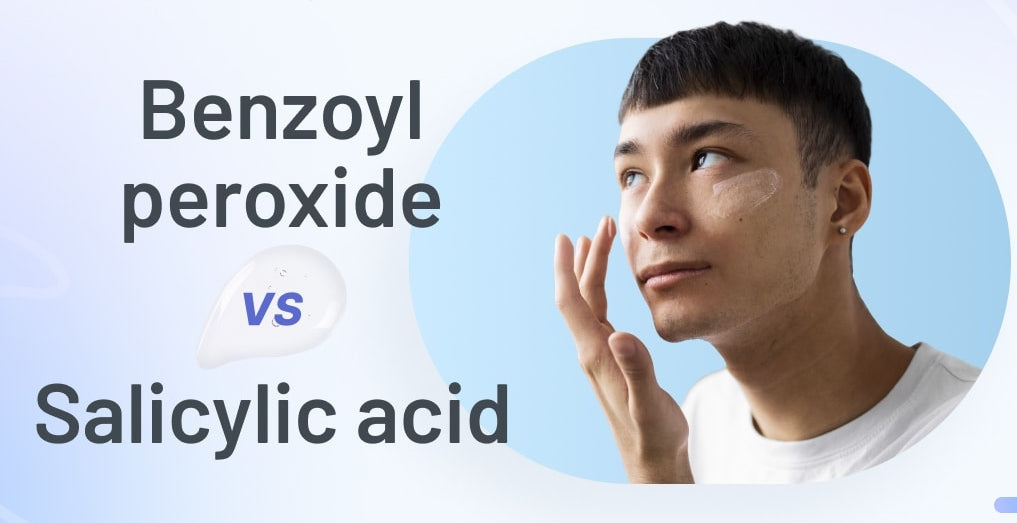
Salicylic Acid vs. Benzoyl Peroxide: The Ultimate Acne-Fighting Showdown!
Salicylic Acid vs. Benzoyl Peroxide: The Ultimate Acne-Fighting Showdown!

Acne is a prevalent skin condition affecting millions worldwide, characterized by various types of blemishes that can impact self-esteem and quality of life. Understanding the different forms of acne and the effective treatments available is important for managing and preventing breakouts. Two of the most effective over-the-counter treatments are salicylic acid and benzoyl peroxide. This article delves into their benefits, differences, and the specific types of acne each address.
Understanding Acne: Types and Causes
Acne manifests in several forms, primarily:
- Blackheads: Open comedones with a dark appearance due to oxidation.
- Whiteheads: Closed comedones that remain under the skin's surface.
- Papules: Small, red, tender bumps without pus.
- Pustules: Pus-filled lesions with a red base.
- Nodules: Large, painful lumps deep within the skin.
- Cysts: Severe, pus-filled infections that can cause scarring.

Factors contributing to acne include excess oil production, clogged pores, bacteria, and inflammation. Hormonal changes, diet, stress, and certain medications can exacerbate these conditions.
Salicylic Acid: Benefits and Applications
Salicylic acid is a beta-hydroxy acid (BHA) renowned for its exfoliating properties. It penetrates oily skin and clogged pores, promoting the shedding of dead skin cells and reducing inflammation. Buy Now

Key Benefits:
- Exfoliation: Removes dead skin cells, preventing clogged pores.
- Anti-inflammatory: Reduces redness and swelling associated with acne.
- Oil Reduction: Decreases sebum production, minimizing shine and potential breakouts.
Best Suited For:
- Blackheads and Whiteheads: Salicylic acid effectively treats non-inflammatory acne by dissolving debris, dirt, pollution within pores.
Benzoyl Peroxide: Benefits and Applications
Benzoyl peroxide is a potent antimicrobial agent that targets and eliminates acne-causing bacteria, reducing inflammation and preventing future breakouts. Buy Now

Key Benefits:
- Antibacterial: Kills bacteria responsible for acne development.
- Exfoliation: Promotes the removal of dead skin cells.
- Oil Control: Helps reduce excess oil on the skin's surface.
Best Suited For:
- Pustules and Papules: Effective against inflammatory acne due to its bacteria-eliminating properties.
Comparing Salicylic Acid and Benzoyl Peroxide
While both ingredients combat acne, their mechanisms and suitable applications differ:
- Mechanism of Action:
- Salicylic Acid: Penetrates pores to exfoliate and reduce inflammation.
- Benzoyl Peroxide: Destroys bacteria on the skin's surface and within pores.
- Skin Type Considerations:
- Salicylic Acid: Ideal for sensitive skin; less likely to cause irritation.
- Benzoyl Peroxide: May cause dryness or irritation; suitable for oily, less sensitive skin.
- Usage Recommendations:
- Salicylic Acid: Can be used daily; found in cleansers, toners, and spot treatments.
- Benzoyl Peroxide: Often used as a spot treatment; start with lower concentrations to assess tolerance.
Choosing the Right Treatment for Your Acne
Selecting between salicylic acid and benzoyl peroxide depends on your specific acne type and skin sensitivity:
- Non-inflammatory Acne (Blackheads/Whiteheads): Salicylic acid is recommended due to its pore-clearing abilities.
- Inflammatory Acne (Pustules/Papules): Benzoyl peroxide is effective in reducing bacteria and inflammation.
For combination acne, a regimen incorporating both may be beneficial. However, it's essential to monitor skin response and avoid excessive dryness or irritation. Consulting with a dermatologist can provide personalized guidance tailored to your skin's needs.
Conclusion
Understanding the roles of salicylic acid and benzoyl peroxide in acne treatment empowers you to make informed decisions about your skincare routine. By identifying your acne type and skin sensitivity, you can select the most effective treatment, paving the way for clearer, healthier skin.